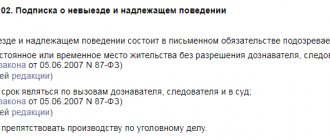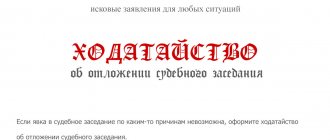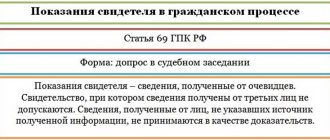Sections are devoted to petitions and complaints. V of the Code of Criminal Procedure, which regulates the main provisions of these forms of appeal by individuals and legal entities - participants in legal proceedings to officials conducting legal proceedings at the pre-trial stages, and to the court. In subsequent sections of the Code of Criminal Procedure, the specifics of the procedure for filing petitions and complaints and their resolution are regulated in relation to each stage of legal proceedings. The allocation in the Code of Criminal Procedure of a special section regulating the general rules of petitions and complaints is due to the significance of these forms of appeal by participants in the process, primarily citizens, to officials and the court, as a guarantee of the protection of their rights and legitimate interests.
Persons who have the right to file a motion in criminal proceedings
Article 119 of the Code of Criminal Procedure of the Russian Federation lists persons who have the right to file petitions in criminal proceedings, namely:
- advocate
- the person who is suspected or accused, and the defenders of these persons
- the person who is the victim and his legal representative and representative
- private prosecutor
- a person who is a civil plaintiff or civil defendant, and representatives of these persons
- a representative of the organization’s administration and another person whose rights and legitimate interests are affected in criminal proceedings
- expert within the framework of the tasks assigned to him by the bodies of inquiry and investigation
ATTENTION: watch a video about defending the rights of the accused by a lawyer and subscribe to our YouTube channel, you will have access to free legal assistance from a lawyer through comments on the video.
Possible reasons for refusal to accept an application
If the consideration of the case is beyond the competence of the body to which the application was submitted. In this case, the request is either forwarded to the competent authority or returned to the applicant with advice to contact the relevant authority.
In the case where the application was submitted by a person or body that does not have the right to protect the interests of an individual. Only participants in the process or their legal representatives can submit an application, request or complaint. When the appeal does not describe in detail the violation and the reasons that prompted the applicant to file a complaint. The application must describe in detail the reasons and motives for the application.
If a decision has already been made on this case, or the parties have reconciled in a global government body. Subject to an arbitration decision.
Time limits for consideration of an application under the Code of Criminal Procedure of the Russian Federation
As a general rule, a petition under the Code of Criminal Procedure of the Russian Federation must be considered immediately after its application.
If the petition cannot be considered immediately during the preliminary investigation, then the period for its consideration is 3 days. In this case, the period of 3 days cannot be extended.
In court hearings, petitions are resolved by the court immediately, with the issuance of an appropriate ruling. Moreover, if the petition is granted, then, according to the prevailing practice, a determination is not made, but, for example, an examination is ordered, or documents are attached.
IMPORTANT: the petition is always submitted to the person in charge of the criminal case; refusal to satisfy the petition entails the right to appeal in accordance with Art. Art. 124 and 125 of the Code of Criminal Procedure of the Russian Federation.
Complaint
A complaint is an appeal to an official conducting legal proceedings or to a court regarding a violation of the rights and legitimate interests of a subject of criminal proceedings or another person whose rights and interests are violated by a decision or action (inaction) of an official or a court.
The following actions (inactions) and decisions are subject to appeal
- body of inquiry, investigator, head of the inquiry unit;
- investigator, head of the investigative body;
- prosecutor;
- court.
The right to appeal in criminal proceedings implements the right written in Part 2 of Art. 46 of the Constitution of the Russian Federation. Therefore, the right to appeal procedural actions (inaction) and decisions is included in the Code of Criminal Procedure among the principles of criminal proceedings (Article 19).
In ch. 16 of the Code of Criminal Procedure regulates the rules of appeal that are common to all stages, which are specified in the rules governing proceedings at a particular stage, by indicating
- persons who have the right to file a complaint,
- requirements for the content of the complaint,
- grounds and deadline for filing a complaint, as well as
- decisions that can be made on a complaint (see, for example, Articles 355, 357, 375 of the Code of Criminal Procedure).
Complaints about actions (inaction) and decisions made during pre-trial proceedings are brought to the prosecutor, the head of the investigative body or to the court at the place where the preliminary investigation was conducted.
The right to appeal against actions (inaction) and decisions of officials conducting legal proceedings has
- all participants in criminal proceedings on the part of the prosecution (clause 18, part 2, article 42, article 43, clause 17, part 4, article 44, article 45 of the Code of Criminal Procedure);
- all participants in criminal proceedings on the part of the defense (clause 10, part 4, article 46, clause 14, clause 18, part 4, article 47, clause 10, part 1, article 53, clause 12, clause 14 h 2 Article 54, Article 55 Code of Criminal Procedure), as well as
- other participants in criminal proceedings (for example, a witness - clause 5, part 4, article 56 of the Code of Criminal Procedure).
One of the guarantees of the right of appeal is the obligation of officials carrying out criminal proceedings to explain the procedure for appealing and to ensure the possibility of exercising this right.
The procedure for considering a complaint by the prosecutor, the head of the investigative body in pre-trial proceedings
The exercise of the right to complain requires accurate and clear registration of the received complaint, notification orally or in writing to the complainant about the acceptance of his complaint for consideration and the period within which the complaint must be considered, and notification to the person who brought the complaint about the decision taken on the complaint.
An oral complaint expressed during an investigative action is recorded accordingly in the protocol of the investigative action.
The prosecutor or head of the investigative body considers the complaint within 3 days from the date of its receipt. In exceptional cases, when in order to verify a complaint it is necessary to request additional materials or take other measures, the complaint may be considered within 10 days, of which the applicant is notified.
Based on the results of consideration of the complaint, the prosecutor or the head of the investigative body issues a decision
- about full or partial satisfaction of the complaint or
- about refusal to satisfy it.
If a complaint filed in accordance with part two of Article 123 of the Code is satisfied, the resolution must indicate the procedural actions taken to speed up the consideration of the case and the deadlines for their implementation.
The applicant must be immediately notified of the decision made on the complaint and the further procedure for appealing it.
In cases provided for by this Code, the inquiry officer or investigator has the right to appeal the actions (inaction) and decisions of the prosecutor or the head of the investigative body, respectively, to a higher prosecutor or the head of a higher investigative body.
More details
The inquirer, investigator, prosecutor, as well as the court, when considering complaints from participants in the process and other persons, must examine and evaluate all the arguments presented in them, as well as motivate their decisions by pointing out specific grounds, sufficient from the point of view of the principle of reasonableness, on which the arguments of the complaint are rejected. Decisions on complaints require the obligatory factual and legal justification of the decisions made.
“Immediate” notification of a decision made on a complaint and an explanation of the procedure for further appealing it requires an exact indication in the message about the considered complaint of the month, day (and sometimes hour) when the decision was made, and the day of communication of this decision to the complainant.
The decision of the prosecutor and the head of the investigative body on the complaint is made in the form of a resolution and, together with the complaint, is attached to the criminal case.
In paragraph 4 of Art. 124 of the Code of Criminal Procedure provides for a special case of appeal - the right of the inquirer or investigator, in case of disagreement with the actions or decisions of the prosecutor or the head of the investigative body, to submit their objections to a higher prosecutor or the head of a higher investigative body. This applies to cases where the inquirer or investigator has the right not to comply with the instructions of the prosecutor or the head of the investigative body, for example, on bringing a person as an accused, the scope of the charges, and to appeal the instructions of the prosecutor, the head of the investigative body to a higher prosecutor or the head of the investigative body (Part 3 of Art. 38, part 4 of article 41 of the Code of Criminal Procedure).
Having recognized the complaint as justified, the head of the investigative body or the prosecutor cancels the decision of the investigator or inquiry officer or gives instructions to terminate the complained actions (inactions), takes other measures to restore the violated rights and freedoms of citizens, and ensure the legitimate interests of legal entities. They have the right to simultaneously take measures to bring to justice those responsible for violations of the law. A complete or partial refusal by a prosecutor or head of an investigative body may be appealed by the applicant to the relevant higher prosecutor or head of an investigative body or to the court.
In Art. 125 of the Code of Criminal Procedure specifies the forms of judicial control over the observance of the rights and legitimate interests of citizens in the stages of pre-trial proceedings. Consideration of complaints against actions and decisions taken during the preliminary investigation by the court with the participation of the parties is one of the manifestations of the constitutional principle of equality of arms and adversarialism already in the pre-trial stages of criminal proceedings and indicates the special role of the court in ensuring the rights and freedoms of citizens.
The decision to refuse to initiate criminal proceedings is subject to appeal. When considering such a complaint, the court cannot and should not assess the sufficiency of the data to initiate a criminal case - this is the prerogative of those persons who are granted such a right. In the case of a complaint about the refusal to initiate a criminal case, the court may, for example, check whether all the necessary actions, at the request of the applicant, were taken to establish the grounds for initiating a case, or disagree with the conclusion that the available data does not show signs of a crime . The court considers the refusal to initiate a case as a decision limiting the right to judicial protection, so it must check whether there are legal grounds for this. If desired, a person who does not agree with the refusal to initiate a criminal case must be familiarized with the materials that are recognized as insufficient for a decision to initiate a criminal case, which gives him the opportunity to substantiate his complaint against the decision to refuse to initiate a criminal case.
A decision to terminate a criminal case or terminate a criminal prosecution can also be appealed.
Article 52 of the Constitution of the Russian Federation guarantees victims of crime and abuse of power access to justice. Therefore, persons in whose opinion the proceedings were illegally terminated at the stage of preliminary investigation, be they a victim, a suspect or an accused, have the right to appeal to the court with a complaint against the decision to terminate the case.
Participants in criminal proceedings have the right to appeal decisions and actions (inaction), including the abandonment of petitions submitted during familiarization with the materials of the criminal case, and to appeal decisions taken on these petitions.
The procedure for considering in court a complaint against actions (inaction), decisions of officials in pre-trial proceedings
In parts 3, 4 art. 125 of the Code of Criminal Procedure sets out the procedure for a judge to check a complaint about the legality and validity of the actions (inactions) and decisions of the inquirer, investigator, head of the investigative body and prosecutor. A necessary condition for exercising the right to file a complaint against the actions and decisions of government bodies and officials in criminal proceedings is the familiarization of the participant in the process with the materials of the case, with which the investigator and prosecutor justify the relevant decision (for example, on extending the period of detention of the accused), and with the materials on the basis of which the court made a decision affecting the rights and interests of a participant in the process or another person.
The court verifies the legality and validity of the actions (inactions) and decisions of these persons no later than five days from the date of receipt of the complaint. This is explained by the need to quickly respond to complaints and decisions made during the inquiry or preliminary investigation, and to comply with the deadlines that determine the investigation, and especially the detention of a person.
The filing of a complaint does not suspend the production of the action being appealed and the execution of the decision being appealed, unless the body of inquiry, the investigator, the head of the investigative body, the prosecutor or the court find it necessary to do so.
Judicial proceedings to consider complaints against actions (inaction) and decisions of persons conducting a preliminary investigation take place on the basis of equality of arms and adversarial proceedings.
The court hearing is attended by the applicant and his defense attorney, legal representative, representative, if they are involved in the case, other persons whose interests are directly affected by the appealed action or decision, as well as the prosecutor.
The failure to appear of persons who were timely notified of the time for consideration of the complaint and who do not insist on its consideration with their participation is not an obstacle to the consideration of the complaint by the court.
At the court hearing, the applicant, who appears at the court hearing, substantiates the complaint, after which other persons who appeared in court are heard (for example, the complaint of the accused about the illegality of seizure of property is considered, but it affects the interests of the victim, therefore he must also be heard by the court).
Based on the results of consideration of the complaint, the judge makes one of the following decisions:
- on recognizing the action (inaction) or decision of the relevant official as illegal or unfounded and on his obligation to eliminate the violation;
about leaving the complaint without satisfaction.
Copies of the judge's decision are sent to the applicant, the prosecutor and the head of the investigative body.
A complaint that is not satisfied by the court may be appealed to a higher court.
How to file a petition in a criminal case?
A petition in a criminal case can be made orally or in writing. A written petition is best submitted through the office under the mark on the applicant’s copy. If a written request is made at a court hearing, then it must be submitted to the court at the hearing. You are not deprived of the right to submit an application through Russian Post or courier mail.
The written request must be attached to the case materials. and oral - must be entered in the protocol of investigative actions, in the protocol of the court session.
Based on the results of consideration of the petition, the official must make a decision, and the court must issue a ruling on whether to satisfy or refuse the stated petition. The answer is brought to the attention of the applicant by sending it to the address of residence; great attention is paid to the content of the motivation for refusing or granting the petition, since everyone must understand what the investigator, inquiry officer or judge was guided by when making the decision.
USEFUL: petitions of a lawyer in criminal cases are an effective tool in the hands of a qualified specialist, and their significance should not be underestimated, as well as the significance of the complaint filed by a lawyer against the actions of law enforcement agencies, watch the VIDEO on this topic from our YouTube channel
Procedure for submitting an application
The suspect, the accused, his defense attorney, the victim, his legal representative and representative, the private prosecutor, the civil plaintiff, the civil defendant and their representatives have the right to file a petition. During the trial, the state prosecutor also has the right to file motions. If it is necessary to obtain a decision or permission to carry out certain procedural actions, the inquirer and investigator file a corresponding petition with the court. For example, if it is necessary to choose detention as a preventive measure, the investigator, with the consent of the head of the investigative body, as well as the investigator, with the consent of the prosecutor, initiates a corresponding petition before the court (Part 3 of Article 108 of the Code of Criminal Procedure of the Russian Federation).
The investigator in the cases provided for in paragraphs 4–9 and 11 of Part 2 of Art. 29 of the Code of Criminal Procedure of the Russian Federation, with the consent of the head of the investigative body, initiates a petition to the court to carry out an investigative action, for which a decision is made (Part 1 of Article 165 of the Code of Criminal Procedure of the Russian Federation). Other participants in criminal proceedings (witness, expert, specialist, personal guarantor, candidate for jury, etc.) may file petitions to ensure the most effective performance of their duties and the exercise of their rights. Thus, a witness has the right to petition for the application of security measures and make other petitions (clauses 5, 7, part 4, article 56 of the Code of Criminal Procedure of the Russian Federation). The expert has the right to petition for the provision of additional materials necessary for giving an opinion, or for the involvement of other experts in the forensic examination (Clause 2, Part 3, Article 57 of the Code of Criminal Procedure of the Russian Federation). The petition is submitted to the inquiry officer, investigator or to the court in charge of the criminal case. These bodies and officials are obliged, in turn, to promptly explain to participants that they have the right to submit petitions and provide the necessary conditions for the exercise of this right.
As a general rule, a petition can be filed at any time during the criminal proceedings. However, in some cases the legislator has established boundaries within which petitions can be submitted. Thus, the defendant has the right to file a petition for consideration of his case by a panel of three judges only before the appointment of a court hearing (Clause 3, Part 2, Article 30 of the Code of Criminal Procedure of the Russian Federation). The accused has the right to file a petition for a verdict without a trial at the time of familiarization with the materials of the criminal case or at a preliminary hearing (Clause 1, 2, Part 2, Article 315 of the Code of Criminal Procedure of the Russian Federation). Rejection of a petition does not deprive the applicant of the right to re-submit the same petition, both within the current and at subsequent stages of criminal proceedings.
The petition may be submitted either in writing or orally. The inquiry officer, investigator or court cannot refuse to accept the petition. A written petition is attached to the criminal case, an oral petition is entered into the protocol of the investigative action or court session. In addition to the request itself, the petition must contain its justification. This requirement, in particular, is established in relation to requests made by the parties in court to call new witnesses, experts, specialists, to demand material evidence and documents, or to exclude evidence obtained in violation of the requirements of the criminal procedure law (Part 1 of Article 271 Code of Criminal Procedure of the Russian Federation). Therefore, in cases where the petition is unmotivated or insufficiently motivated, the inquiry officer, investigator, or court has the right to receive from the person who filed the petition an explanation of the rationale for his request.
Request for additional investigative actions
First of all, from the list of lawyer’s petitions related to investigative actions, petitions for participation in these actions should be highlighted. Indeed, a competent defense requires active actions on the part of the lawyer, and therefore his participation in investigative measures is mandatory. During an interrogation, search, examination, confrontation or investigative experiment, details and nuances may be revealed that were previously unknown to either the investigation or the defense attorney, and it will be the absolute duty of the lawyer to take them into account and use them for the benefit of his client.
A lawyer can also file motions that affect the procedure for carrying out certain investigative actions. For example, if the defense attorney has reasons not to trust the expert institution chosen by the investigation, he may file a motion to entrust the examination to another organization.
Rules for writing and structure of the petition
The form and sample for writing a petition are not defined by law. The author of the document must adhere to the general principles of drawing up procedural documents. This means that the paper must contain several required blocks:
- introductory – “header” containing the name of the authority, the composition of the participants and their procedural role, and contact information;
- a title that reflects a brief essence;
- content and argumentation;
- requirements put forward by the author of the appeal;
- list of applications;
- date and signature (mark of acceptance of the document if it was submitted through the office).
Petition to change the preventive measure
One of the most significant petitions of a criminal defense lawyer is a petition to change the preventive measure. As a rule, investigators strive to ensure that detention is chosen as a preventive measure against the accused.
They are, of course, understandable - the alleged criminal will be under supervision in uncomfortable conditions, which will allow the investigators to put pressure on him and manipulate him. However, the accused himself probably does not agree with them, because sitting in a pretrial detention cell throughout the entire investigation is still a pleasure. Therefore, in this case, a competent defense attorney must make every effort to write a reasoned and convincing petition to replace the preventive measure.
Such requests are quite often granted, but if a person is accused of committing a serious or especially serious crime, in 99% of cases you can forget about replacing the preventive measure with a more lenient one. Consult a lawyer on how to file this type of petition.
Information to be reflected in the document form
The form and content of the petition are drawn up in accordance with the model in the current legislation. However, in the process of filling out and submitting papers, you must adhere to a number of rules. After entering the information, you have to leave some space. It will indicate the court case number.
Then the citizen will have to provide the following data:
- the name of the authority to which the judicial appeal is sent;
- information about the applicant. It is important to reflect reliable contact information that allows you to contact the person if necessary;
- information about the person who acts as a defendant. Additionally, his contact information is recorded. A citizen can be an individual or a representative of a company. In the first case, the residential address and telephone number are recorded. When a company acts as a defendant, its legal address is reflected;
- the reason for petition. The purpose of the application must be described. The circumstances under which the violation of rights, freedoms and interests occurred. It is important to briefly describe all the information about the reason that gave rise to the application;
- presentation of evidence. It is possible to provide evidence of unlawful acts committed against the applicant;
- the requirements put forward;
- the cost of the claim and the process of calculating the amount. If a person wishes to return the funds spent, it is important to reflect this fact by presenting arguments confirming the legality of this;
- about an attempt to pre-trial resolve the dispute. It is important to record whether the plaintiff spoke with the defendant previously, as well as on what topic;
- list of documentation attached to the application. It is important to list the entire list of papers. This will reduce the risk of losing evidence or refutation.
Petition to terminate criminal prosecution
Standing apart among the petitions of a criminal lawyer is the petition to terminate the criminal prosecution. If the investigation of a criminal case has been going on for quite a long time, but the investigation has not provided relevant and admissible evidence of the accused’s guilt, and there are significant doubts that the accused person actually committed a crime, it is time to file such a petition.
By the way, if the petitions do not give a positive result, we must not forget about the procedure for appealing the verdict through the appellate procedure, as well as the further cassation procedure.
Assistance from a lawyer in drawing up a petition in Yekaterinburg
Our lawyer is ready to help you through a meeting in the office or remotely in terms of drawing up a petition in a criminal case of any category:
- We will consult on the need and advisability of filing a petition in the case, and determine how much this appeal will help the defense line
- We will draw up an agreement on the provision of legal assistance with the Law Office “Katsailidi and Partners”, specifying the deadlines for completing the work, the price of the application (cost from 1,000 rubles and above, depending on the complexity and category of the performer on our part) and the procedure for interaction
- We will issue an invoice and wait for payment. By making a cash payment or receipts to the organization’s bank account
- We will draw up a petition within the framework of criminal proceedings. We will also discuss its submission with our help.
- We will provide other legal assistance as part of the defense of your case at the stage of investigation, inquiry or in court
Call and make an appointment for an initial consultation with a lawyer today to start building a defense: professionally, on favorable terms agreed upon for you and on time!!!
Existing categories
A petition in a civil case may be filed in writing or orally. In the second case, the request is made during court hearings. However, experts advise making the petition in writing and formally submitting it to the judge. The filing of a court application is made through the office. Here the court paper will be assigned an incoming correspondence number. If you plan to submit your application via mail, it is better to use registered mail. It is supplemented by an inventory of investments.
A large amount of judicial practice has highlighted several main issues that can be resolved by filing a petition:
- restoration of circulation terms. The request for re-submission is recorded in the court application. This may be the statute of limitations, the time allocated for appealing the actions taken, filing a complaint and the time for proceedings on labor conflicts;
- carrying out the examination. Such complaints record all the features relating to the implementation of such actions or consideration of the final results;
- payment for legal matters. The petition raises issues of payment of state fees or other payments that in one way or another relate to the proceedings.
There are a number of features of the execution of a previously made decision. It is sent after the judge has rendered the appropriate verdict and it has entered into legal force.
Video







